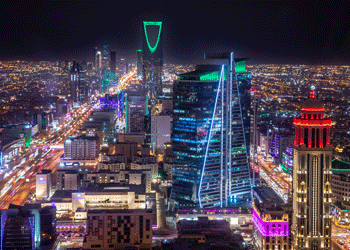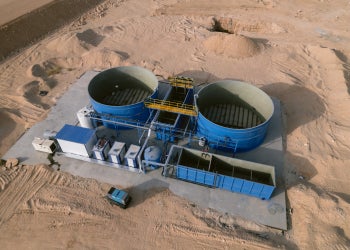Saudi Arabia’s football vision goes global
27 September 2023
MEED's October 2023 special report on Saudi Arabia also includes:
 > POLITICS: Saudi Arabia looks both east and west
> POLITICS: Saudi Arabia looks both east and west
> GIGAPROJECTS: Gigaproject activity enters full swing
> TRANSPORT: Infrastructure projects support Riyadh’s logistics ambitions
> UPSTREAM: Aramco focuses on upstream capacity building
> DOWNSTREAM: Saudi chemical and downstream projects in motion
> POWER: Riyadh rides power projects surge
> WATER: Saudi water projects momentum holds steady
> BANKS: Saudi banks track more modest growth path
> JEDDAH TOWER: Jeddah developer restarts world’s tallest tower

Saudi Arabia has invested more than $6.3bn in sport since early 2021, but that figure will be a fraction of what is coming if plans for its 18-club Saudi Pro League bear fruit.
The kingdom’s entry into world football started in October 2021, when the Public Investment Fund (PIF) bought Newcastle United. Benefitting from a new manager and fresh on-field talent, the team came fourth in the premiership in the 2022-23 season and qualified for this year’s European Champions League.
It is said that Riyadh aims to emulate Abu Dhabi, which bought Manchester City in 2008, but the kingdom’s ambitions go beyond owning a single European club: it is aiming to remake its position in world sport.
The exertions are not dissimilar to the way in which the Brics economic grouping, which the kingdom was invited to join in August, hopes to remake the world’s monetary dogma by breaking the dollar’s grip on the global economy. The Saudi Pro League may be the kingdom’s way of ending Europe’s dominance in football.
Establishing the Saudi Pro League as one of the best will enhance the kingdom’s desire for a say at the highest levels of global club football
Mixed returns
Abu Dhabi has demonstrated that owning a football club can deliver benefits that go beyond income and capital appreciation. It has boosted the emirate’s image, promoted its airline Etihad and given Abu Dhabi a seat at the table of the English Premier League. It has also faced challenges.
Manchester City has been accused of breaching Premier League and Uefa rules about licensing and financial sustainability. In 2020, it was fined and banned from European competitions for two years for alleged breaches of Uefa’s fair play rules, though that was overruled. The club is now subject to a long-term investigation into 115 alleged breaches of Europe’s fair play rules.
Now Newcastle United, which the premiership never wanted to be bought by Saudi Arabia, is being closely scrutinised for evidence that the kingdom is unfairly boosting the club’s spending.
There are also signs that the British football boom, which began after the English premiership was created in 1992, is coming to an end. Top clubs enjoyed a windfall from satellite television rights and then the influx of investment from wealthy individuals, starting with Russia’s Roman Abramovitch 10 years later. This has now been overshadowed by the financial might of Abu Dhabi and Saudi Arabia in England and by Qatar, owner of Paris Saint Germain since 2011, in France.
But the appetite among even the wealthiest investors for football assets may be fading. Earlier this year, Manchester United’s owners rejected an offer for the club from Qatar as inadequate.
Sports Saudisation
Saudi Arabia’s new approach is different. Instead of sending money overseas, it is looking to invest heavily in football within the kingdom. In the 2023 summer transfer season, Saudi Pro League clubs spent a net $907m on players, more than all of the Big Five leagues but the Premier League, which spent $1.39bn.
The economic benefits are easily comprehended. PIF finance would go into building domestic stadiums and training facilities. Money paid to players and support staff would be retained in the kingdom. In addition to a domestic audience of football fans, Saudi Arabia has international airports and an aviation network to bring in fans from across the globe.
Establishing the Saudi Pro League as one of the best will enhance the kingdom’s desire for a say at the highest levels of global club football.
European football’s perilous financial position is why plans for a European Super League comprising 12 teams, announced in the spring of 2021, initially attracted support from the clubs involved. It was scrapped at the last minute, but dreams of a super league – and the problems that inspired it – remain. It is conceivable that the kingdom could argue a case for membership should it be revived, though that is a consideration for the future.
In the meantime, Saudi Arabia’s impact on football is already being felt. Last December, Portugal’s Cristiano Ronaldo signed for Riyadh’s Al-Nassr. Other top players that have since signed to play in the kingdom include Brazil’s Neymar, Ballon d’Or holder Karim Benzema, African Footballer of the Year Sadio Mane, World Cup winner N’Golo Kante and former Liverpool captain Jordan Henderson.
In July, Kylian Mbappe turned down an offer from Riyadh’s Al-Hilal worth almost €300m ($321.5m) and a salary of €200m for a one-season stay. But – in what would be a coup for the Saudi league if it is accepted – a world-record signing fee is reported to have been offered by Al-Ittihad in September for Egypt’s Mohamed Saleh.
Newcastle United could fit into the kingdom’s broader football plan as a source of talent that can be sold to the Saudi league to bring money into the English club while avoiding the fair play charges encumbering Manchester City. The first example of the process may have been Allan Saint Maximim, who was transferred to Al-Ahli for a reported transfer fee of almost $30m in July.
Last summer, Riyadh also launched what is now the Liv Golf League. There has also been talk of it buying a US National Football League club. The kingdom is investing in other sports as well, but it is football that it is bringing home this autumn.
Exclusive from Meed
-
 Solar deals signal Saudi Arabia’s energy ambitions
Solar deals signal Saudi Arabia’s energy ambitions13 February 2026
-
 Saudi Arabia appoints new investment minister
Saudi Arabia appoints new investment minister13 February 2026
-
 Indian firm wins major Oman substation contract
Indian firm wins major Oman substation contract12 February 2026
-
 Developers appoint contractor for $500m wastewater treatment project
Developers appoint contractor for $500m wastewater treatment project12 February 2026
-
 Dewa raises Empower stake in $1.41bn deal
Dewa raises Empower stake in $1.41bn deal12 February 2026
All of this is only 1% of what MEED.com has to offer
Subscribe now and unlock all the 153,671 articles on MEED.com
- All the latest news, data, and market intelligence across MENA at your fingerprints
- First-hand updates and inside information on projects, clients and competitors that matter to you
- 20 years' archive of information, data, and news for you to access at your convenience
- Strategize to succeed and minimise risks with timely analysis of current and future market trends

Related Articles
-
 Solar deals signal Saudi Arabia’s energy ambitions
Solar deals signal Saudi Arabia’s energy ambitions13 February 2026
 Commentary
Commentary
Mark Dowdall
Power & water editorSaudi Arabia’s recent agreement to build $2bn-worth of solar power plants in Turkiye is the latest sign that the kingdom’s energy influence is changing.
Historically, this was measured in oil barrels and export volumes. Increasingly, this is extending to capital, structuring expertise and the ability to deliver record-low tariffs in competitive markets.
Announcing the deal, Turkish Energy Minister Alparslan Bayraktar said tariffs for the plants would be the country’s lowest on record, with electricity purchased under 25-year power purchase agreements.
It followed another announcement, in January, that Acwa is investing $200m to build a large-scale solar photovoltaic (PV) plant in the Philippines.
Whether Saudi-backed companies ultimately retain long-term stakes or primarily develop and build the assets, their role at the front end is significant.
Sponsors that bring sovereign backing, clear procurement processes and access to low-cost financing can influence tariffs and contract terms from the outset.
There is also a geopolitical layer. Investing in Turkiye, or anywhere for that matter, strengthens political and economic ties at a time when regional alignments are shifting.
Energy infrastructure is also long-term by its nature. It connects ministries, regulators, lenders and operators in relationships that often extend well beyond a single transaction.
Saudi Arabia has spent the past few years refining its approach to pricing, structuring and financing large-scale renewables at home.
Exporting that expertise may not rival oil in scale or visibility, but it does signal that Saudi Arabia is becoming more than just an energy supplier.
Increasingly, it is becoming a participant in how other countries design and finance their energy transitions. That influence is still significant.
https://image.digitalinsightresearch.in/uploads/NewsArticle/15645903/main.jpg -
 Saudi Arabia appoints new investment minister
Saudi Arabia appoints new investment minister13 February 2026
Register for MEED’s 14-day trial access
King Salman Bin Abdulaziz Al-Saud has made a series of senior government changes, including Khalid Al-Falih leaving his role as investment minister to become minister of state and a member of the cabinet.
Al-Falih has been replaced by Fahad Al-Saif as investment minister. Al-Saif has been head of the Investment Strategy and Economic Insights Division at the Public Investment Fund (PIF) since 2024. That role involved formulating PIF’s long-term investment strategy. He has also served as head of the Global Capital Finance Division, a role he has held since joining PIF in 2021.
The change of investment minister comes at a time when securing investments has become a key priority for Saudi Arabia as it prepares to hand over more projects to the private sector for delivery.
King Salman also named Abdullah Al-Maghlouth as vice-minister of media and Abdulmohsen Al-Mazyad as vice-minister of tourism. Khalid Al-Yousef was named attorney general, and Sheikh Ali Al-Ahaideb will serve as president of the Board of Grievances.
Faihan Al-Sahli was selected as director general of the General Directorate of Investigation, while Abdulaziz Al-Arifi was chosen to lead the National Development Fund. Haytham Al-Ohali will head the Communications, Space and Technology Commission, and Fawaz Al-Sahli will chair the Transport General Authority.
https://image.digitalinsightresearch.in/uploads/NewsArticle/15645415/main.gif -
 Indian firm wins major Oman substation contract
Indian firm wins major Oman substation contract12 February 2026

India’s Larsen & Toubro has won a contract to build the Majan 400/220/132kV grid station in Oman.
Estimated to cost $100m, the project includes an associated 400kV line-in line-out underground cable from Sohar Free Zone to the Sohar Interconnector Station.
The contract was awarded by Oman Electricity Transmission Company (OETC), part of the government-owned Nama Group.
The grid station will comprise eight 400kV gas-insulated switchgear (GIS) bays, eight 220kV GIS bays and 10 132kV GIS bays at the new Sohar Free Zone substation.
The scope includes the installation of two 500MVA, 400/220kV transformers and two 500MVA, 220/132kV transformers.
Local firm Monenco Consulting Engineers was appointed in April last year to provide design and supervision services for the project.
As MEED exclusively revealed, the main contract was tendered in June, as part of three significant contracts to build new substations in the sultanate.
The second contract, worth about $35m, covers the construction of the Sultan Haitham City 132/33kV grid station and associated 132kV line-in line-out underground cables running 4 kilometres from Mabella to Mabella Industrial Zone.
The third contract, valued at about $100m, covers the construction of the Surab 400/33kV grid station and an associated 400kV line-in line-out cable from the Duqm grid station to the Mahout grid station.
Local firms Muscat Engineering Consulting and Hamed Engineering Services are consultants for the Sultan Haitham City and Surab projects, respectively.
The two remaining contracts are currently under bid evaluation, with awards expected this quarter.
https://image.digitalinsightresearch.in/uploads/NewsArticle/15638107/main.jpg -
 Developers appoint contractor for $500m wastewater treatment project
Developers appoint contractor for $500m wastewater treatment project12 February 2026

Register for MEED’s 14-day trial access
Egypt’s Orascom Construction has won the engineering, procurement and construction (EPC) contract for a major wastewater treatment project in Saudi Arabia’s Eastern Province.
A consortium of Saudi utilities provider Marafiq, the regional business of France’s Veolia and Bahrain/Saudi Arabia-based Lamar Holding is developing the $500m (SR1.875bn) industrial wastewater treatment plant (IWWTP) in Jubail Industrial City 2.
Sources close to the project confirmed the appointment to MEED, adding that the project has now entered the construction phase.
Industry sources also said that financial close on the project is expected to be reached in the coming days.
In September, the developer consortium was awarded a contract, under a 30-year concession agreement, by Saudi Aramco Total Refining & Petrochemical Company (Satorp), a joint venture of Saudi Aramco and France’s TotalEnergies.
The planned facility will treat and recycle wastewater from Satorp’s under-construction Amiral chemical derivatives complex, also in Jubail.
Marafiq, formally Power & Water Utility Company for Jubail and Yanbu, will own a 40% stake in the dedicated project company. Veolia Middle East SAS will hold a 35% stake, and Lamar Holding’s Lamar Arabia for Energy will hold the other 25%.
The planned IWWTP, which will primarily serve the $11bn sprawling Amiral chemicals zone, will implement advanced water treatment and recovery technologies to process complex industrial effluents, including spent caustic streams. Treated water will be reintegrated into the industrial processes, supporting closed-loop reuse and energy efficiency.
The project follows a concession-style model, akin to a public-private partnership (PPP), where the developer consortium invests in, builds and operates the wastewater plant over a 30-year period, with returns linked to service delivery.
Marafiq has been involved in several similar projects across Saudi Arabia, including as the sole owner of the Jubail industrial water treatment plant (IWTP8), which treats complex industrial effluents for petrochemical and heavy industrial companies.
In 2020, Saudi Services for Electro Mechanic Works was awarded the $202m main contract for the fourth expansion phase of IWTP8. Construction works on the project are expected to be completed by the end of the quarter.
 READ THE FEBRUARY 2026 MEED BUSINESS REVIEW – click here to view PDF
READ THE FEBRUARY 2026 MEED BUSINESS REVIEW – click here to view PDFSpending on oil and gas production surges; Doha’s efforts support extraordinary growth in 2026; Water sector regains momentum in 2025.
Distributed to senior decision-makers in the region and around the world, the February 2026 edition of MEED Business Review includes:
> AGENDA: Mena upstream spending set to soar> INDUSTRY REPORT: MEED's GCC water developer ranking> INDUSTRY REPORT: Pipeline boom lifts Mena water awards> MARKET FOCUS: Qatar’s strategy falls into place> CURRENT AFFAIRS: Iran protests elevate regional uncertainty> CONTRACT AWARDS: Contract awards decline in 2025> LEADERSHIP: Tomorrow’s communities must heal us, not just house us> INTERVIEW: AtkinsRealis on building faster> LEADERSHIP: Energy security starts with rethinking wasteTo see previous issues of MEED Business Review, please click herehttps://image.digitalinsightresearch.in/uploads/NewsArticle/15637523/main.jpg -
 Dewa raises Empower stake in $1.41bn deal
Dewa raises Empower stake in $1.41bn deal12 February 2026
Dubai Electricity & Water Authority (Dewa) has announced it has increased its stake in Emirates Central Cooling Systems Corporation (Empower) from 56% to 80%.
The transaction was completed through the purchase of 2.4 billion shares and the transfer of the entire ownership of Emirates Power Investment (EPI), which is wholly owned by Dubai Holding.
The total value of the deal is AED5.184bn ($1.41bn).
Empower currently holds over 80% of Dubai’s district cooling market and operates 88 district cooling plants across the emirate.
According to MEED Projects, the UAE’s district cooling sector currently has nine projects worth $1.29bn in the pre-execution phase.
Empower has ownership in four of these projects, which have a combined value of $472m.
This includes a $200 million district cooling plant at Dubai Science Park, with a total capacity of 47,000 refrigeration tonnes serving 80 buildings.
Empower signed a contract to design the plant last August, with construction scheduled to begin by the end of the first quarter of 2026.
The utility is also building a district cooling plant at Dubai Internet City.
UAE-based TMF Euro Foundations was recently appointed as the enabling and piling subcontractor for the project.
https://image.digitalinsightresearch.in/uploads/NewsArticle/15635949/main.jpg


